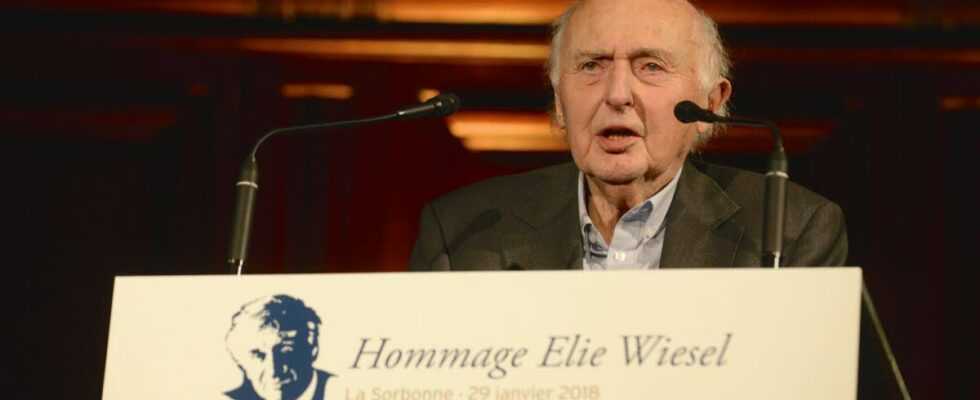For a long time, like many survivors of the camps, he was silent and did not want to return to Auschwitz. Then Elie Buzyn, who died on Monday at the age of 93, worked to transmit the memory of the Shoah, calling on young people to be “witnesses to witnesses”.
“Hold on while you can”
With his fellow survivors of the horror, “human wrecks who were said to take twenty years to die”, this doctor born on January 7, 1929, father of the former Minister of Health Agnès Buzyn, had made himself a promise: “Hold on as long as we can”.
He succeeded beyond all hope, having lived several lives and survived several deaths. First that of his brother Avram, shot in March 1940 by the Nazis to dissuade any attempt to escape from the Jewish ghetto of Lodz (Poland), where the Buzyn family had been parked.
“In 1944, we vaguely knew that the Soviet Army was coming from the East. There was a small hope that it would end”, he confided in 2015. “We were told that we were going to another labor camp, where the conditions would be much better”.
“I owe my survival to the other deportees”
A journey in cattle cars in the heat of the summer of 1944, followed by the arrival on the sorting docks of the Birkenau extermination camp (Auschwitz-II).
“Some deportees received us. I owe them survival. I was 15 years old. They threw me: “Say that you are 17-18 years old!”. The SS looked at me, obviously he didn’t believe me. He gave me a punch in the chest to test my resistance, I did not fall”. The adolescent is deemed fit for forced labor. Later, “in 30 seconds”, he “knew what had happened” to his parents, murdered in the gas chambers.
On January 18, 1945, faced with the advance of the Red Army, he was ordered to evacuate Auschwitz by one of those “death marches” where any sign of weakness was punished with a bullet in the back of the neck.
After three days and two nights, the displaced are piled into a train to Buchenwald. Elie stayed there until April 1945 among 900 orphans. “We who came from Eastern Europe did not want to return home. We knew we had nothing left.
“For my uncle, a surgeon at the Rothschild hospital in Paris, “I could enter into a normal life. I disagreed. Europe was soiled for me”.
Entrusted among hundreds of teenagers to the Children’s Relief Work (OSE) in France, an important Jewish organization of which he would later be a pillar, Elie Buzyn made many detours before returning to settle in Paris: seven years in a Palestine still under British mandate then erected into the State of Israel, a new visit to France without success during his studies, two years in a college in Oran (Algeria)…
In 1956, it is the final return to France, where he will become an orthopedic surgeon and will marry a renowned psychoanalyst, Etty Buzyn (née Wrobel), specialist in early childhood.
“Witnesses of witnesses”
Elie Buzyn will have his deportee tattoo surgically removed, as if to erase this trauma from his memory. “You can’t live if you live with this every day,” he says.
Half a century after the genocide, his twenty-something-year-old son told him: “I want to go to Auschwitz to see where my paternal grandparents disappeared. I understand this is too hard for you. I will go alone, with a group”. “In the minute I told him: + If someone has to accompany you, it’s me +”, confided Dr Buzyn.
From then on, he considered it “a duty” to testify in schools and at Auschwitz, with the groups led each year by the Chief Rabbi of France Haïm Korsia.
Elie Buzyn took his children there, and several of his eight grandchildren, when they were over the age of fifteen.
He remained convinced that all those whom he had helped to approach the horror of the camps would “become witnesses in their turn. Witnesses of witnesses”.
